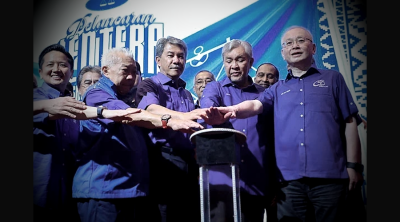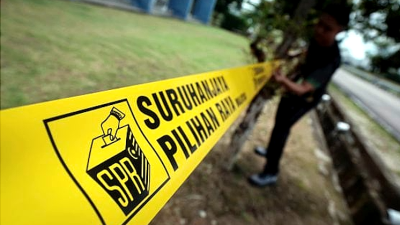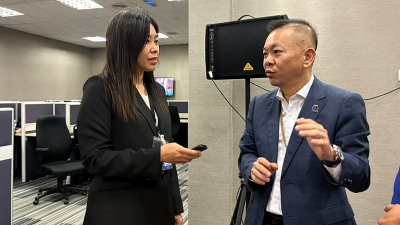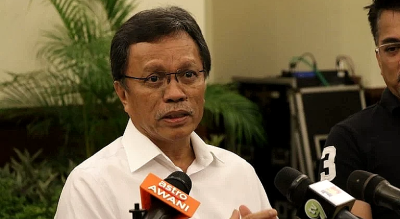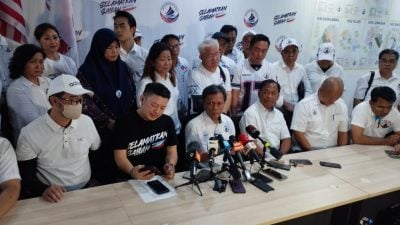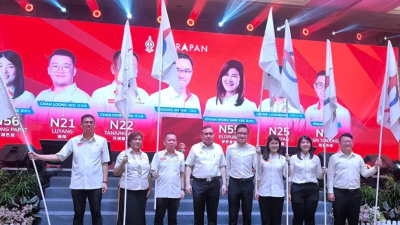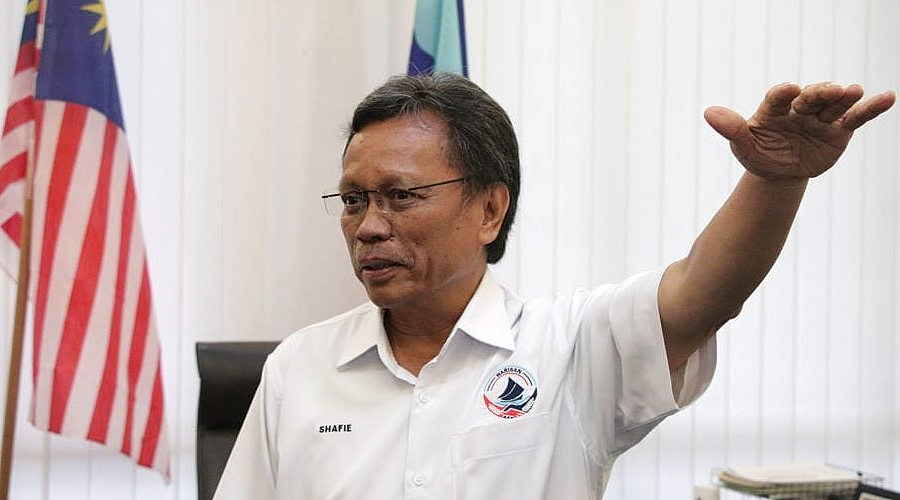
KOTA KINABALU: A local Chinese will be appointed finance minister if Parti Warisan wins the Sabah election and returns to power, says its president Datuk Seri Mohd Shafie Apdal.
The appointment of a local Chinese means recognition of the long-term contribution of the Chinese community to the economic development in the state, he said.
Shafie also promised to continue with the inclusive policies implemented during his first term as chief minister, such as increasing the number and value of scholarships, boosting financial allocations to schools of all streams and religious organizations, and ensuring that the fruit of development is shared by all.
In an exclusive interview with Sin Chew Daily, Shafie said, “First, let us win the election. Once we do, the very first thing I will do is appoint a local Chinese as finance minister.
“This isn’t about pleasing anyone—it’s about acknowledging the vital role the Chinese community has played in building Sabah’s economy.”
If this happens, the appointment will mark the first time in nearly 30 years a local Chinese has been appointed Sabah finance minister since Datuk Yong Teck Lee.
When Warisan was in power in 2018, the Sabah state cabinet included four Chinese ministers and four deputy ministers—the highest number of Chinese representation in Sabah’s history.
Under the previous Barisan Nasional (BN) administration, there were at most three Chinese ministers.
The current Gabungan Rakyat Sabah (GRS) coalition initially had no Chinese ministers until it formed an alliance with Pakatan Harapan (PH), after which two Chinese ministers were appointed.
As chief minister at the time, Shafie also followed Sabah’s tradition of appointing Datuk Christina Liew—then chairperson of Sabah PH—as deputy chief minister, demonstrating his trust in and reliance on Chinese leaders from both Warisan and PH to help govern the state.
Shafie emphasized that the Warisan administration in 2018 was one of the most inclusive in Sabah’s history, with appointments based on merit rather than race or religion.
He made it clear that the Chinese community would continue to have a strong voice in the cabinet—not for political expediency but because the community is a pillar of Sabah society.
“We are building Sabah. We cannot exclude anyone,” he said.
Shafie noted that the Warisan-led government was among the first in Malaysia to recognize the Unified Examination Certificate (UEC) issued by Chinese independent high schools.
During a Mid-Autumn Festival event on September 28, 2019, Shafie officially announced in his capacity as chief minister that UEC holders would be eligible to apply for Sabah civil service positions, enroll in the state’s public universities and qualify for state scholarships.
However, less than a year after this policy was introduced—and before it could be fully implemented—the Warisan government collapsed due to political defections, ending its tenure in less than two years.
Shafie explained that Warisan recognized the UEC because it understood that Chinese independent schools, like national schools, serve students of all ethnic backgrounds and are committed to imparting knowledge and nurturing well-rounded individuals.
“I am confident that Chinese schools do not only teach language but also provide students with broader knowledge and life skills beyond the classroom.
“That’s precisely why we believe the UEC should be recognized.”
Warisan would increase scholarship allocations for students from all communities and those in need, and continue boosting funding for schools of all streams and religious groups, he said.
Shafie admitted that during his brief first term—cut short by the pandemic, movement control orders, and mass defections—many proposed initiatives could not be realized.
Warisan’s philosophy, he stressed, is to treat all students fairly, ensuring that both needy and high-achieving students, including those from Chinese vernacular and independent schools, have access to state scholarships.
If re-elected, the party would increase the value of scholarships offered by the state government and the Sabah Foundation to enable more Sabah students to pursue higher education locally and overseas.
“Education is the foundation of society. We must treat every student fairly and give them the opportunity to reach higher levels of education,” he said.
In response to current Chief Minister Datuk Seri Hajiji Noor’s recent announcement of a RM5 million scholarship fund specifically for independent Chinese school students, Shafie remarked that under Warisan’s administration, UEC students were already eligible for state scholarships—making Hajiji’s move “essentially identical to Warisan’s existing policy,” he said.
Warisan’s top priorities are to unite Sabah’s people and rescue the state from its current challenges, he said.
“We must rally the entire population of Sabah to ensure Warisan does not only secure a simple but two-thirds majority.”
He noted that Sabah’s history has seen two instances of single-party majority rule—the Parti Bersatu Sabah(PBS) and Parti Bersatu Rakyat Jelata Sabah (BERJAYA).
Shafie expressed confidence that Warisan could become the third.
Warisan will continue using its longstanding slogan “UNITY” while adopting “Selamatkan Sabah” (“Save Sabah”) as the central theme of this election, aiming to foster unity among all ethnic groups to safeguard Sabah’s future.
“We want to build a state government that protects and advances the interests of all communities—not one that serves only party interests,” he said, adding that Warisan’s first-term cabinet included representatives from all major ethnic groups, and its policies always prioritized Sabah and its people.
Although the Sabah state legislative assembly has already passed an anti-hopping law, Warisan—having suffered twice from mass defections—is taking extra precautions.
Shafie supports the practice, used by PKR, of requiring candidates to sign binding agreements before being fielded.
“We will require all our candidates to sign a guarantee agreement. If they defect after being elected, they will not only lose their seats under the anti-hopping law but must also pay the party a penalty of at least RM10 million,” he said.
He emphasized that the party invests significant resources, money, and effort in grooming candidates and will not allow anyone to use Warisan as a “stepping stone” to power only to betray the people’s mandate afterward.
While welcoming leaders from other parties to join Warisan, Shafie reiterated that anyone with a history of party-hopping may only become an ordinary party member and will not be considered as a Warisan election candidate.
Shafie also promised that if re-elected, Warisan would continue its policy of not appointing elected representatives as chairs of state statutory bodies or government-linked companies (GLCs)—a practice he criticized as a form of political patronage under previous administrations.
“Those with genuine interest in helping GLCs grow may be considered for board membership, but they will not be appointed as CEOs or chairs,” he said.
“Appointing individuals with no management experience to lead GLCs would only hinder their operations and undermine our goal of driving economic growth.”
Shafie acknowledged that during the final phase of Warisan’s 2018–2020 administration, two assemblymen were appointed as GLC chairs—a decision that drew public criticism.
“That is a lesson we must reflect on and learn from,” he concluded.
ADVERTISEMENT
ADVERTISEMENT






